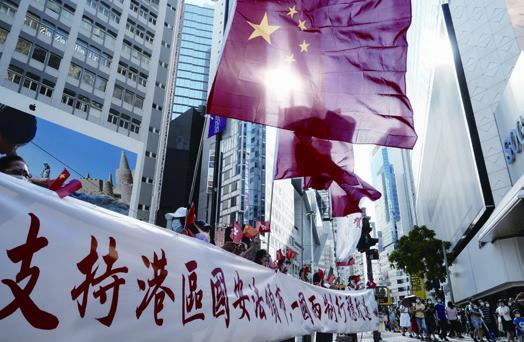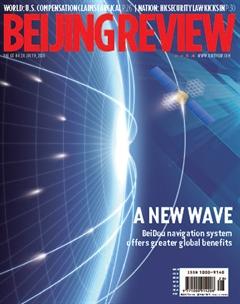Law on Safeguarding National Security in Hong Kong Takes Effect

Lawmakers unanimously voted to adopt the Law of the Peoples Republic of China on Safeguarding National Security in Hong Kong Special Administrative Region (HKSAR) at the 20th Session of the Standing Committee of the 13th National Peoples Congress(NPC), Chinas top legislature, on June 30. President Xi Jinping signed a presidential order to promulgate the law, which went into effect the same day. This is an edited excerpt from Xinhua News Agency reports:
The Law of the Peoples Republic of China on Safeguarding National Security in HKSAR came into force in Hong Kong at 11:00 p.m. local time on June 30 upon its promulgation by the HKSAR Government in the gazette.
With 66 articles in six chapters, the law clearly defi nes the duties and government bodies of HKSAR for safeguarding national security and four categories of offences—secession, subversion, terrorist activities and collusion with a foreign country or external elements to endanger national security—and their corresponding penalties.
According to the law, the Central Government will set up an offi ce in HKSAR for safeguarding national security. HKSAR will establish a committee for safeguarding national security under the supervision of and accountable to the Central Government. To be chaired by the HKSAR chief executive, the committee shall have a national security adviser designated by the Central Government. The Hong Kong Police will also set up a department for safeguarding national security, according to the law.
After the law was passed, the NPC Standing Committee consulted its HKSAR Basic Law Committee and the HKSAR Government, and adopted on the afternoon of June 30, by a unanimous vote, a decision to list the law in Annex III to the HKSAR Basic Law.
The newly adopted decision stipulates that the law shall be applied locally in HKSAR by way of promulgation by the region.
HKSAR Chief Executive Carrie Lam said in a statement that the HKSAR Government welcomes the passage of the law.
“I am confident that after the implementation of the national security law, the social unrest which has troubled Hong Kong people for nearly a year will be eased and stability will be restored, thereby enabling Hong Kong to start anew, focus on economic development and improve peoples livelihood,” she said.
Wide support
The law came after prolonged social unrest and escalating street violence had plunged Hong Kong into the gravest situation since its return to the motherland in 1997. Rampant activities of “Hong Kong independence” organizations and violent radicals as well as blatant interference by external forces have disrupted Hong Kong residents daily life and threatened their safety.Addressing the closing meeting of the NPC Standing Committee session, Li Zhanshu, Chairman of the NPC Standing Committee, said the unanimous passage of the law and the decision has refl ected the common will of the Chinese people including Hong Kong compatriots.
Stressing that national security, social stability and the order of rule of law are the premises of the development of Hong Kong, Li said the legislation represents the aspirations of the people and an irresistible trend of the times.
In a statement, the Hong Kong and Macao Affairs Office of the State Council voiced fi rm support for the law, calling it a milestone event that will usher in a turning point for Hong Kong to end chaos and bring back order.
In a separate statement, the Liaison Offi ce of the Central Peoples Government in HKSAR said the promulgation and implementation of the law on the occasion of the 23rd anniversary of Hong Kongs return to the motherland is an event worth celebrating for all Chinese people, including Hong Kong compatriots.
Nearly 2.93 million Hong Kong residents earlier signed a petition in support of the national security legislation during an eight-day campaign starting May 24.
Both ‘sword and ‘guardian
The Hong Kong and Macao Affairs Office said in its statement that for a tiny number of people endangering national security, the law will be a “sharp sword” hanging over their heads.But for the vast majority of Hong Kong residents including foreigners in Hong Kong, the law will be a “guardian” that protects their rights, freedoms and peaceful life.
According to the law, people convicted of national security crimes could face up to life imprisonment.
Convicted criminals will be disqualifi ed from running for public offi ce, and people in public office who are found guilty of such crimes will be removed from their posts.
The law shall apply to acts committed after its coming into force for the purpose of conviction and imposition of punishment, according to its provision.
Upon promulgation, the law will resolutely and effectively safeguard national security and ensure that the “one country, two systems” cause is steered toward the right direction, Li said.
The law will vigorously uphold the constitutional order and the order of rule of law in HKSAR, forestall and deter external interference, and safeguard Hong Kongs fundamental, long-term and current interests, he said.
Global understanding
“We reiterate that Hong Kong is an inseparable part of China, that Hong Kong affairs are Chinas internal affairs that brook no interference by foreign forces. We urge relevant sides to stop interfering in Chinas internal affairs by using Hong Kong related issues,” a joint statement signed more than 50 countries at the 44th Session of the United Nations Human Rights Council on June 30 said.“Non-interference in internal affairs of sovereign states is an essential principle enshrined in the Charter of the United Nations and a basic norm of international relations.”
“In any country, the legislative power on national security issues rests with the state, which in essence is not a human rights issue and therefore not subject to discussion at the Human Rights Council,” a representative of Cuba read the joint statement on behalf of the signatories.
“We believe that every country has the right to safeguard its national security through legislation, and commend relevant steps taken for this purpose,” the statement said. “In this context, we welcome the adoption of the decision by Chinas legislature to establish and improve a legal framework and enforcement mechanisms for HKSAR for the purpose of safeguarding national security, as well as Chinas reaffi rmation of adherence to the ‘one country, two systems guideline.”
It said this move is conducive to ensuring “one country, two systems” is steady and enduring, and that Hong Kong enjoys long-term prosperity and stability. The legitimate rights and freedom of Hong Kong residents can also be better exercised in a safe environment.

